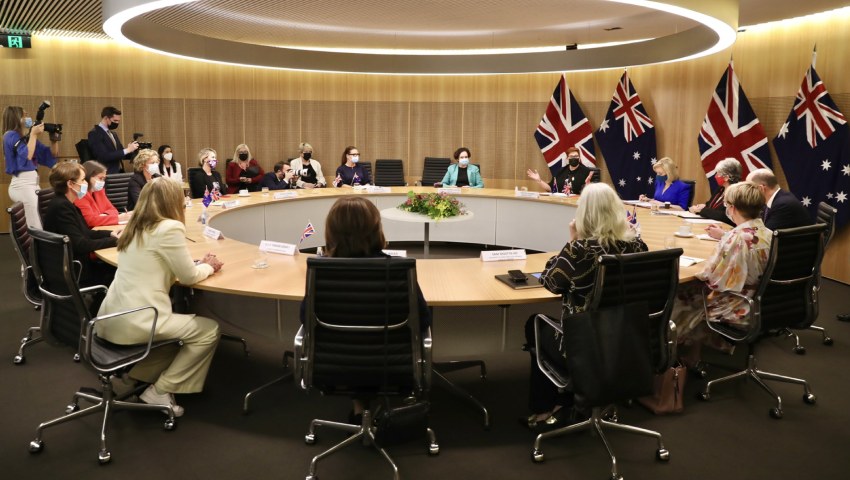How can these long-standing allies more effectively deploy resources in the region to achieve shared objectives?
Canberra and Westminster recently renewed their commitment to preserving peace and stability in the Indo-Pacific, agreeing to ramp up collaboration across a number of security initiatives.
This included the signing of a Cyber and Critical Technology Partnership, aimed at shaping a positive technology environment and thwarting mounting cyber threats.
The agreement was signed during AUKMIN discussions between Australian Minister for Foreign Affairs Marise Payne, Minister for Defence Peter Dutton, and their UK counterparts, Secretary of State for Foreign, Commonwealth and Development Affairs Elizabeth Truss and Secretary of Defence Ben Wallace.
Secretary Truss ‘s visit represented the first formal meeting in Australia between the long-standing allies since the AUKUS deal was announced in September — a major technology sharing arrangement between Australia, the UK, and the US, set to involve the local development of nuclear-powered submarines for the Royal Australian Navy.
According to Ben Bland, director, Southeast Asia program at the Lowy Institute, this visit reflects the growing strategic importance of the Indo-Pacific for the UK, with the trip pushing ahead despite internal turmoil, and an escalation in regional tensions.
“In the midst of a security crisis in Ukraine and a domestic political crisis that may unseat Prime Minister Boris Johnson, Britain’s foreign and defence ministers have chosen to fly to the other side of the world for talks with their Australian counterparts,” he writes.
“It looks like a strange decision at first glance. But this week’s visit by Foreign Secretary Liz Truss and Defence Secretary Ben Wallace suggests that Britain is serious about its ‘tilt’ to the Indo-Pacific, which was announced last year as part of a broad review of British security and foreign policy.”
He notes that this shift in focus would be much welcomed by Canberra, which continues to grapple with the challenges posed by Beijing aggression.
However, Bland acknowledges the uneasiness surrounding the strengthening of ties between Australia and the UK, which he said could be described as a “comfort blanket”.
“That fear is compounded by scepticism about what a post-Brexit Britain can bring to the table beyond post-imperial delusions of grandeur,” he continues.
“Certainly, one predictable outcome of [the visit] is a chorus of warm official talk about shared values, the need to uphold the ‘rules-based order’ (whatever that is), and standing up for ‘liberty’ in the face of coercive behaviour from the Chinese government.”
But Bland argues that the true value of the Australia-UK partnership is in the nations’ “complementary” geostrategic interests in the region, not their historic bond.
“This is particularly apparent in south-east Asia, which is the geographic centre of the Indo-Pacific and the primary arena for geopolitical competition between China on the one hand and the United States and its allies on the other,” he adds.
“For reasons of proximity and history, south-east Asia is naturally more important to Australia than it is to the UK. But the British government has intensified its engagement with the region over the past two years, with ministers travelling to the region as often as their Australian counterparts.”
Bland points out that Australia has “better developed security relationships” in the Indo-Pacific, noting its membership of multinational bodies like the East Asia Summit and the ASEAN Regional Forum.
The UK, on the other hand, boasts technologies and capabilities that can “augment” Australia’s security posture.
“The two governments will need to spend less time talking about their shared values and more time listening to regional partners,” Bland writes.
“On the economic front, Australia has more extensive trade relationships with south-east Asia, but Britain has a far more globalised corporate sector, with deep regional roots and world-beating companies in the finance, technology and healthcare industries. And the UK can leverage London’s financial centre as a catalyst to provide the large-scale investment that south-east Asian nations need to continue developing.”
According to the Lowy Institute analyst, Australia and the UK should “capitalise on their different diplomatic styles”.
Bland says the UK could leverage its position on the United Nations Security Council and its imperial history, while Australia adopts a “nimbler, more pragmatic approach to regional engagement”.
This, he claims, should involve moving beyond “cheap rhetoric” in the “grant struggle” against China.
“Working alongside other partners such as the US, Japan and the Europeans, Australia and Britain need to focus on helping our south-east Asian neighbours to become more secure, prosperous and resilient in their own right,” he writes.
“Although Australia and Britain feel comfortable dialling down economic, technological and political ties with China, that is not a luxury that any south-east Asian nation can afford.”
Canberra and Westminster, he continues, should also avoid lecturing south-east Asian partners about China’s flaws, but instead support their development efforts.
“The challenge, as always, will be implementation, turning diplomatic memos into action on the ground,” he argues.
“To succeed in this endeavour, the Australian and British governments will need to spend less time talking about their shared values and more time listening to and learning from regional partners.
“Australia and the UK bring different but complementary forms of influence to the Indo-Pacific. And there are many synergies to be had, if their approach is framed by the region’s practical needs as much as the interests of outside powers.”
Get involved with the discussion and let us know your thoughts on Australia’s future role and position in the Indo-Pacific region and what you would like to see from Australia's political leaders in terms of partisan and bipartisan agenda setting in the comments section below, or get in touch with



